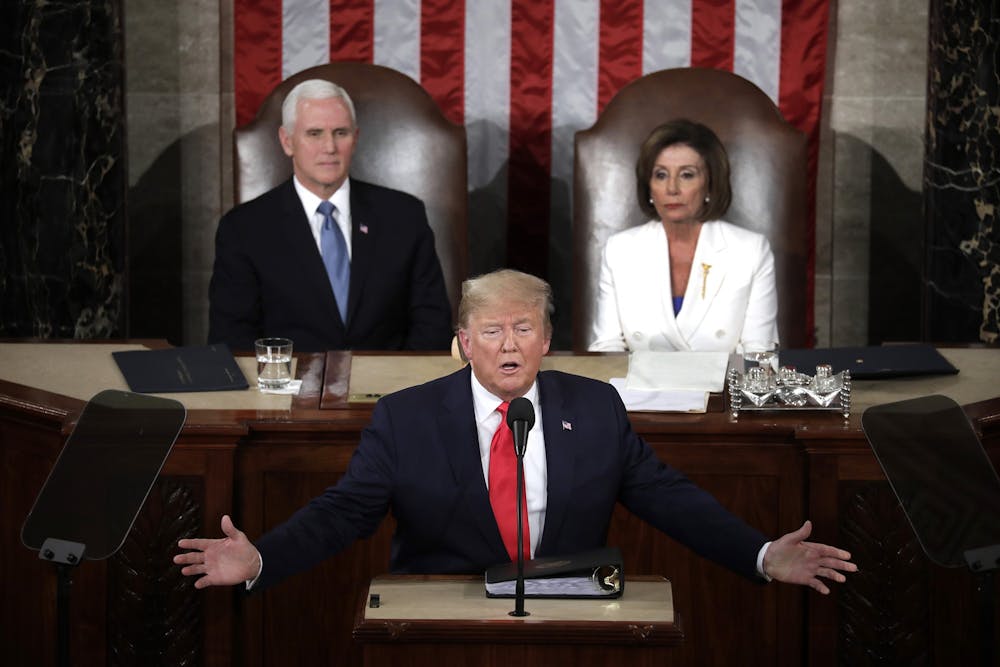President Donald Trump delivered his third State of the Union address Tuesday night, touting the United States’ strong economy and asserting his crucial role in its recovery. The unemployment rate is at a 50-year low, wages have increased and the stock market has reached record highs.
“I am thrilled to report to you tonight that our economy is the best it has ever been,” Trump said.
But that's not the whole story.
Perceptions of the economy depend on who you ask. According to a Pew Research Center report in December, 75% of Republicans but just 41% of Democrats thought the country’s economic conditions were excellent or good. The numbers were different for poorer Americans: Just over half of low-income Republicans and only one-third of low-income Democrats rated the economy positively.
Democrats must rebuke Trump’s claims on the economy in this light. Regardless of party, poorer Americans do not feel the economy — despite low unemployment and a booming stock market — works for them.
Behind all of this is the belief, shared by a majority of both parties and nearly 70% of Americans, that current economic conditions are helping the wealthy, while over half of Americans say they hurt the poor and middle class.
Americans are right to feel this way. More than three-quarters of full-time workers say they live paycheck to paycheck, according to a 2017 poll. Further, 71% of all U.S. workers are in debt and most believe they always will be. At the same time, Federal Reserve data shows that the top 1% of Americans have more wealth than the bottom 90%.
A strong majority of voters recognize the economy works for the wealthy and against the poor and middle class. According to the Institute for Policy Studies, 1 in 5 U.S. households have zero or negative net worth, which includes 30% of black households and 27% of Latino households.
Democrats must offer a bold alternative to Trump in November, not someone who promises a return to normalcy. Just as unemployment began trending downward years before Trump's election, the challenges facing the American working class began years ago.
“We know too that the entrenched disparities and inequities impacting our communities didn’t begin when that man descended an escalator in Trump Tower,” Rep. Ayanna Pressley, an endorser of Sen. Elizabeth Warren, said in the Working Families Party’s State of the Union response. “They are the results of decades of short-sighted, exclusionary policies.”
As union membership rates in the U.S. began to decrease in the 1980s, so did the middle class’s share of total income. As membership rates declined 20%, the richest Americans took a much larger share of total income. The richest 5% of Americans now earn nearly a quarter of all income, according to the U.S. Census Bureau.
If anything, Trump has made the economy worse.
In Indiana, Trump’s trade war with China has taken its toll. Indiana exports to China fell from $3.1 billion in 2017 to $2.2 billion one year later. Indiana farmers were hit the hardest: The state’s exports of oilseeds crops, such as soybeans, fell from $1.1 billion to $238 million over the same period. In a period of high unpredictability, Indiana farmers took the hit even while wealth continued to increase for the country’s richest.
For the first time in this country’s history, Trump’s tax cuts have allowed billionaires to pay a lower effective tax rate than the average working person.
After greenlighting the continued proliferation of wealth inequality, the Trump administration has made clear that it’s on the side of the wealthy. Trump showed most clearly that he stands against the poor by bragging about barring 7 million Americans from food stamps in his State of the Union speech.
“This is what Trump really means when he talks about a booming economy,” Sen. Bernie Sanders said in his response to the State of the Union. “Since he has been in office, billionaires have seen their wealth increase by $854 billion, a 37% increase.”
Democrats can and should nominate a candidate dedicated to structural change, one who can convince working-class Americans that Trump is beholden to the wealthy and one who understands the pain being caused by the so-called strongest economy in U.S. history.
Kyle Linder (he/him) is a junior studying journalism and international relations. He plans to pursue a career in media.






